An axle is vital for a car to operate optimally, much like a support system is necessary for humans to thrive. Consequently, a vehicle’s axle is a key component.
The type of car can determine the number of an axle. There are cars with two or three depending on the car variation, but you can determine the number of a vehicle axle through its number of tires.
It simply means when a car has two sets of tires, it has two axles. In most cases, a vehicle has two axles: the Front and Rear axle.
Let’s look at the types, functions, and replacement of the front axle of a car.
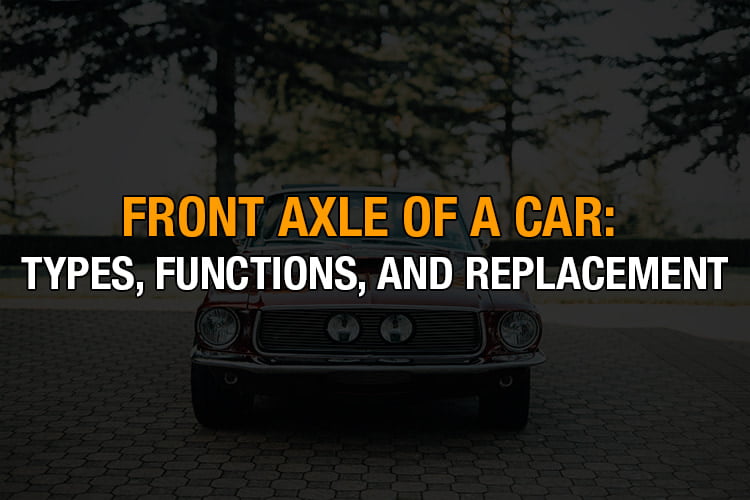
The Overview Of Car Axle
The car axle can be referred to as the support system of the vehicle because it helps the steering when applying the brake.
What Is A Car Axle?
A car axle is a shaft or rod that helps rotate the car’s gear or wheel.
Most vehicles have more than two axles, and their axles come in standard form, while some cars have customized axles designed to fit the car’s specifications.
Generally speaking, having a car with a personalized axle makes it work faster and better because the manufacturers designed it to have absolute control over the wheel.
These personalized axles help with the torque and wheel speed adjustments.
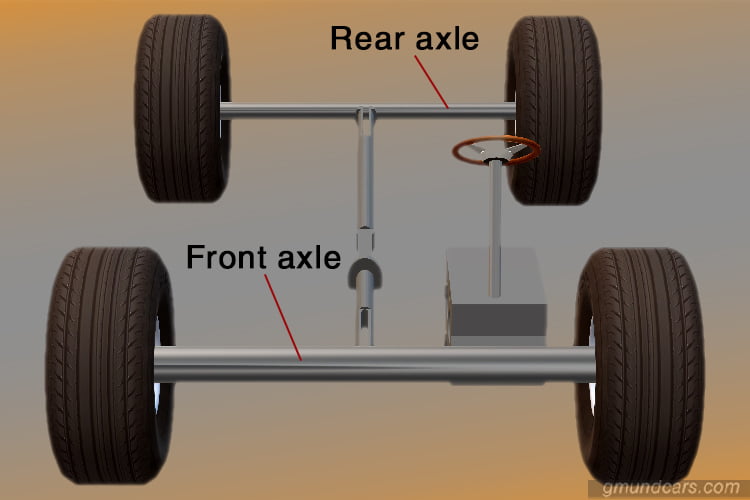
Types Of Axle
There are three types of axles: Front Axles, Rear Axles, and Stub axles.
- The Front Axle
The front axle, located in the front of a car, supports or carries the vehicle steering and shocks when driven through the rough surface of a road.
The front axle consists of Nickel or carbon steel for proper functionality.
- The Rear Axle
The rear axle is wholly responsible for distributing power to the driving wheels. They move with the vehicle’s wheel and come in two equal parts, mainly called “Half Shaft”.
- The Stub Axle
Stub axles are attached to vehicles’ front. They are connected to the front axles of the car through the Kingpins.
Read more: Torsion Axle Vs. Leaf Spring: Which One Is Better?
Understanding About The Front Car Axle
The front car axle has an I-section at the car’s center, while the end part comes in a circular form during construction.
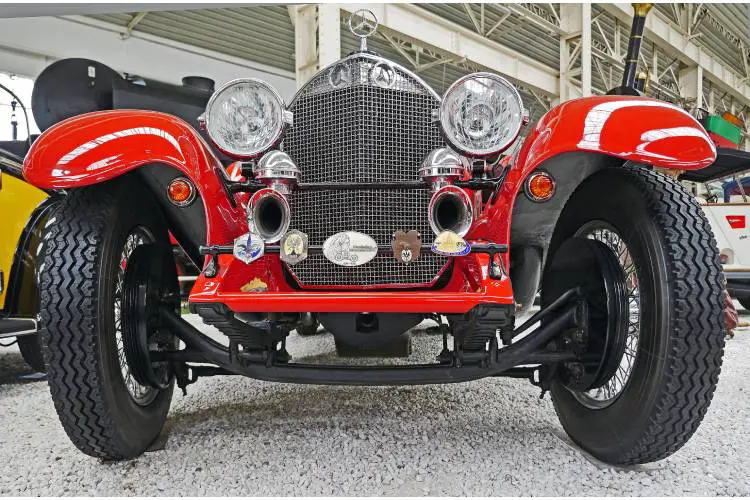
Credit: Pxhere.com
Functions
Below are the functions of a front car axle:
- Take the weight of front portion of the vehicle.
- Help the car maintain its balance when driven on rough roads.
- Give the wheel steering full support.
Types Of Front Car Axles
There are two types of Front car axles: Dead and Live Front car axles.
- Dead Front Axle
These axles are still, and that’s because they don’t rotate with the wheel. In addition, they have shields that disallow them from close contact with dirt or water.
- Live Front Axle
On the other hand, this axle distributes driving forces and torque from the gearbox to the front wheels. They are fixed on the wheels, allowing them to rotate with the wheel.
Read more: Nissan Dashboard Symbols and Meanings: What All Drivers Need To Know
Front Car Axle Replacement
The front axle is responsible for rotating the wheels, so regularly inspect it.
How To Inspect Front Car Axle
Two basic types of vehicle inspection will help you determine if your car axles are due for replacement.
The Driving Inspection
You can determine if the axles need repair or replacement through test-driving once you notice any of these signs:
- Hear a loud clunk anytime you put your car into gear.
- Feel vibrations when you operate your vehicle.
- The car refuses to move forward or backward while it is running.
The Visual Inspection
Another way to determine if your car axle is not in good shape is through visual inspection.
It is the easiest part of the inspection because all you need to do is take a close look at the boot and check for grease or holes leaking once you see that; you then check the shaft to see if anything is rubbing on it. If you notice any dirt rubbing on the shaft, then you need to call for replacement.
How To Replace The Front Car Axle
Below are steps to replace the front car axle.
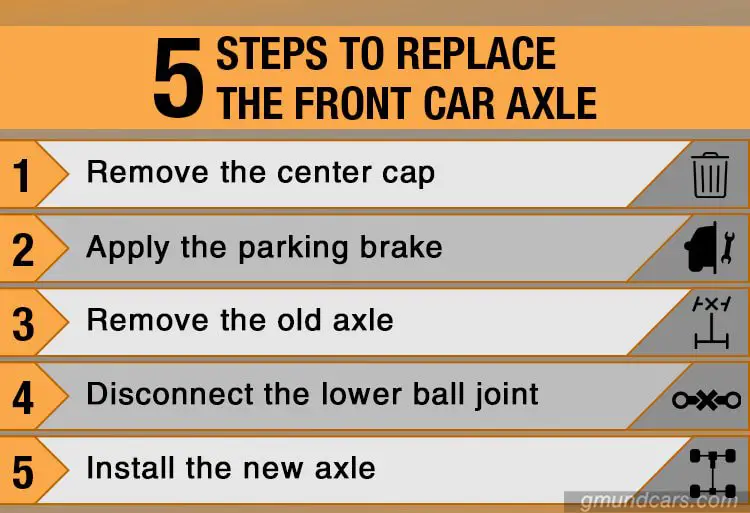
Step 1: Remove the center cap
The first step is to take the wheel you want to replace and remove the center cap. But for vehicles without rims, you have to remove the vehicle hubcap.
Step 2: Apply the parking brake
The next step is to apply the parking brake, which helps your car balance well before you can remove the wheel. You must first ensure the vehicle parks well, after which you then apply the parking brake. Once you do this, you must lift the car to jack properly.
At this time, the nuts holding the wheel will be visible. Remove the lug nuts, and the wheel will come off.
Step 3: Remove the old axle
To remove the old axle, first, remove the cotter pin. The nut always takes significant torque to remove. Once the axle nut is out, you can then go ahead to remove the old axle.
Step 4: Disconnect the lower ball joint
Look through the part where you remove the axle, and you will see the joint where it switches into the lower ball joint’s transmission to be disconnected. If it doesn’t come loose immediately, you might need to break the seal forcefully.
Step 5: Install the new axle
To insert the new axle, you need to follow how you removed the old one by fixing it in the same spot. Then, the peg will slide in until the axle is flush against the housing.
Insert the new axle into the center of the hub assembly at the same spot where you removed the old axle.
Replacement Cost
The cost of replacing a front axle varies substantially depending on the type and model of your vehicle. However, going by the general price, the replacement could fall between $200- $1600.
The labor costs typically range between $100 and $200 depending on how long the mechanic will take to replace your axle. Replacement labor generally takes 2-3 hours. Although, some vehicles can be more expensive and time-consuming.
Read more: Broken Axle: Signs And Causes
Rear And Stub Axles
The rear and stud axles are in connection to the front axles. They distribute driving force to the wheels.
Types Of The Rear Axles
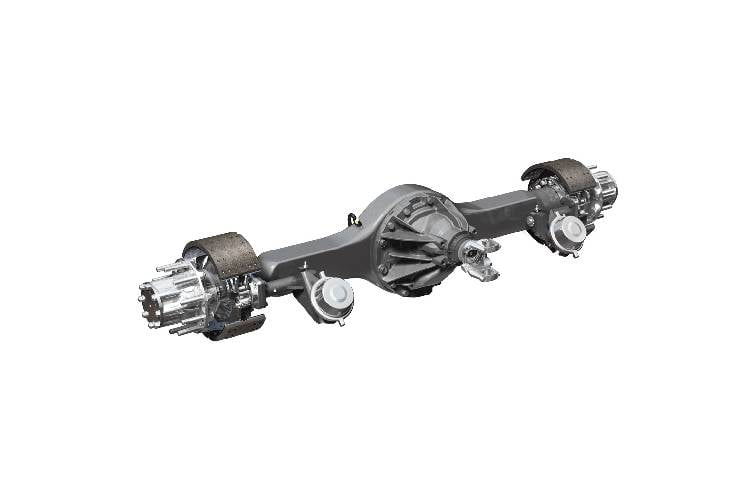
Credit: Flickr.com
There are three types of rear axles. They are:
- Semi-Floating Axle
This axle helps to hold the car’s wheel firmly through the flange. SUVs, trucks, and cars use semi-floating axles.
- Full-Floating Axle
This rear axle works by its name because it floats effectively in one place, maintaining its position.
- Three-Quarter Floating Axle
This particular rear axle is more reliable and complex than the semi-floating axle. In addition, it assists with the maintenance of the wheel alignments and driving torque.
Types Of The Stub Axles
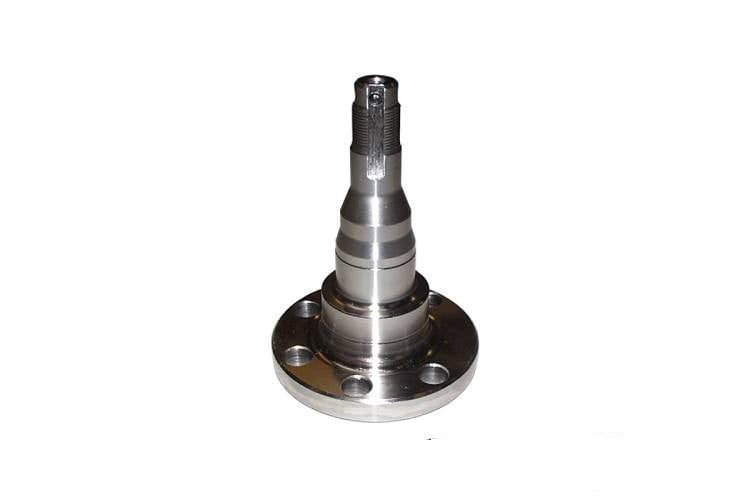
Credit: jpgroupclassic.com
- Elliot
This stub axle is attached to the front axle by a yoke-type hinge, a kingpin, and a cotter.
- Reverse Elliot
The Reverse Elliot is a direct opposite of the Elliot stub axle. It also connects with the front axle using a yoke-type hinge, kingpin, and cotter but in the opposite order of the Elliot.
- Lamoine
This stub axle uses an L-shaped spindle connected to receive the front axle. Front axle vehicles like tractors mostly use a Lamoine.
- Reverse Lamoine
The reverse Lamoine is a direct opposite of a Lamoine. It functions in the front axle of a rear-wheel-drive car.
Conclusion
Axles are important parts of your car that keep it stable on the road. To avoid unnecessary spending and break out, you should inspect the front, rear, or stub axle. Once an axle breaks at the central point, it won’t be easy to drive your car.